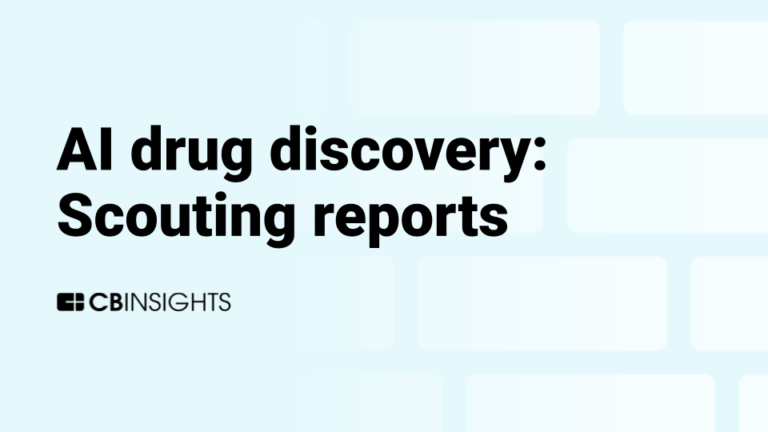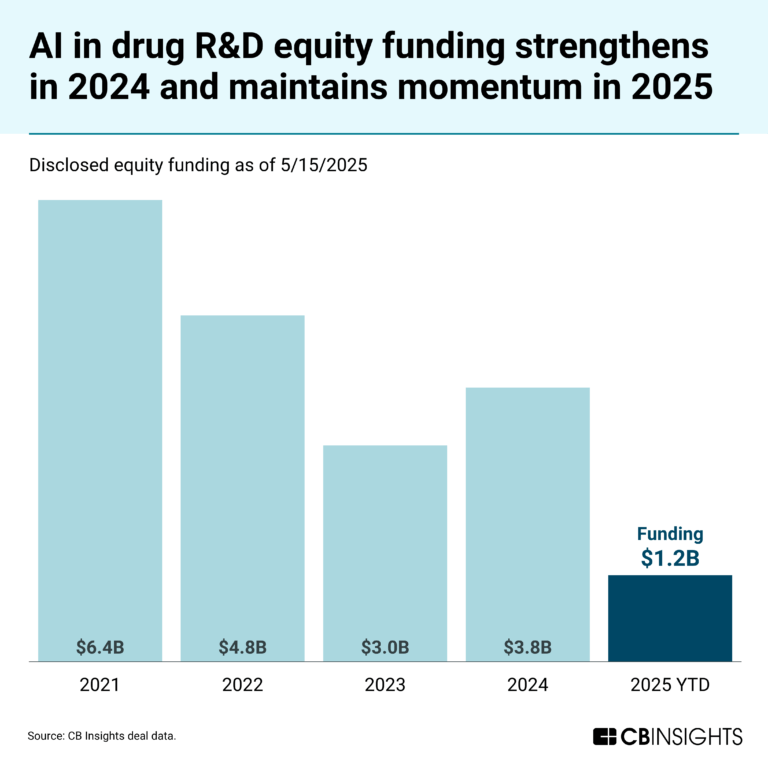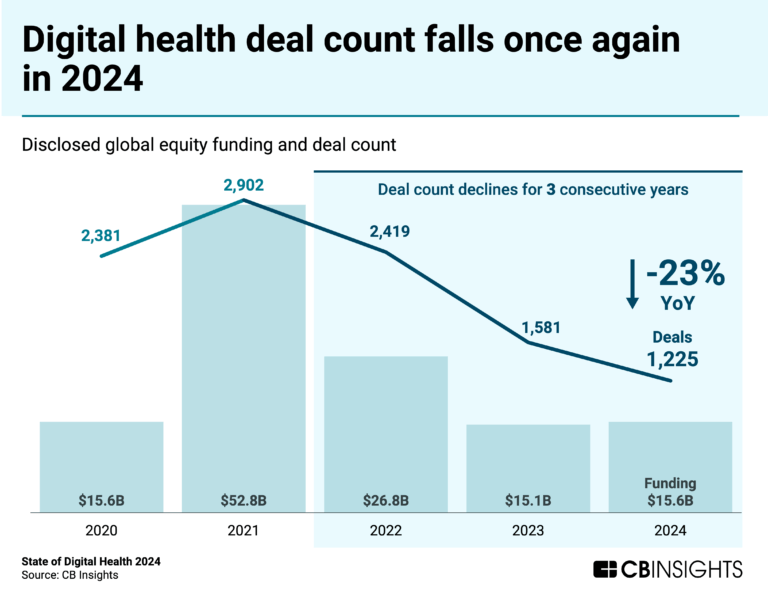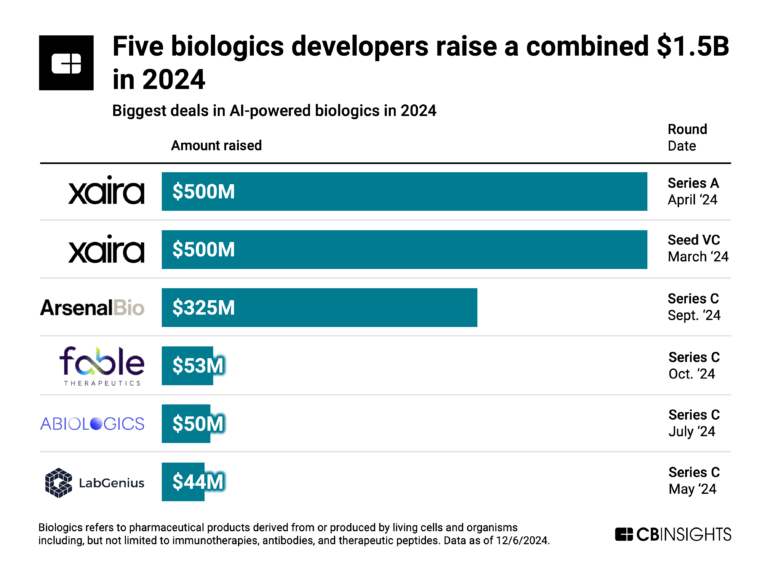
Xaira Therapeutics
Founded Year
2023Stage
Series A | AliveTotal Raised
$1BLast Raised
$500M | 2 yrs agoMosaic Score The Mosaic Score is an algorithm that measures the overall financial health and market potential of private companies.
+8 points in the past 30 days
About Xaira Therapeutics
Xaira Therapeutics operates as a biotechnology company focused on drug discovery and development through the application of artificial intelligence. The company specializes in creating computational methods, models, and data sets to enhance the process of discovering and developing new therapeutics. Xaira Therapeutics primarily serves the biotechnology and pharmaceutical sectors. It was founded in 2023 and is based in South San Francisco, California.
Loading...
Loading...
Research containing Xaira Therapeutics
Get data-driven expert analysis from the CB Insights Intelligence Unit.
CB Insights Intelligence Analysts have mentioned Xaira Therapeutics in 6 CB Insights research briefs, most recently on Sep 19, 2025.

Sep 19, 2025 report
Book of Scouting Reports: AI Drug Discovery
Aug 22, 2025 report
Book of Scouting Reports: Generative AI in Healthcare & Life Sciences
May 23, 2025
The AI in drug R&D market map
Jan 16, 2025 report
State of Digital Health 2024 ReportExpert Collections containing Xaira Therapeutics
Expert Collections are analyst-curated lists that highlight the companies you need to know in the most important technology spaces.
Xaira Therapeutics is included in 5 Expert Collections, including Unicorns- Billion Dollar Startups.
Unicorns- Billion Dollar Startups
1,297 items
Artificial Intelligence (AI)
37,256 items
Companies developing artificial intelligence solutions, including cross-industry applications, industry-specific products, and AI infrastructure solutions.
Generative AI
2,951 items
Companies working on generative AI applications and infrastructure.
Digital Health
12,122 items
The digital health collection includes vendors developing software, platforms, sensor & robotic hardware, health data infrastructure, and tech-enabled services in healthcare. The list excludes pureplay pharma/biopharma, sequencing instruments, gene editing, and assistive tech.
AI in drug discovery
528 items
Companies using AI to advance therapeutic discovery, categorized into: platforms (primary product is software) and discovery engines (primary product is therapeutics). Additional funnel descriptions reflect how companies are applying AI.
Latest Xaira Therapeutics News
Nov 7, 2025
Scientists use AI to create antibodies entirely from scratch 0 Scientists at the University of Washington’s Institute for Protein Design have used artificial intelligence to create antibodies entirely from scratch, a breakthrough that could reshape drug discovery. This new research, published in Nature , is another key breakthrough for Baker’s team, whose previous work on AI-powered protein design won him last year’s Nobel Prize in Chemistry. A ‘pipe dream’ realised “It was really a grand challenge – a pipe dream,” said Andrew Borst, Head of Electron Microscopy R&D at IPD. Now that the team has succeeded in engineering antibodies that successfully bind to their targets, Borst said the research “can go on and it can grow to heights that you can’t imagine right now.” Automation now plays a central role in discovery. From self-driving laboratories to real-time bioprocessing This report explores how data-driven systems improve reproducibility, speed decisions and make scale achievable across research and development. Inside the report: Integrate AI, robotics and analytics to speed decision-making Streamline cell therapy and bioprocess QC for scale and compliance And more! This report unlocks perspectives that show how automation is changing the scale and quality of discovery. The result is faster insight, stronger data and better science – access your free copy today Until now, antibody discovery rested upon on immunising animals and waiting to see if useful molecules were produced – a slow, costly and unpredictable process. Despite these challenges, this research has been fundamental to the development of new treatments for cancer and autoimmune diseases. Designing the building blocks of life Baker’s Nobel-winning work focused on deciphering the molecular design of proteins and creating AI tools that could model and refine them in silico. The new technology learns from existing proteins and how they function, then proposes entirely new molecular designs to tackle specific biological problems. In this latest research, researchers turned their attention to the six flexible loops of protein on an antibody’s arms – the structures that grip onto targets such as viruses or toxins. The new technology learns from existing proteins and how they function, then proposes entirely new molecular designs to tackle specific biological problems. “We are starting totally from scratch – from the loop perspective – so we’re designing all six,” explained Robert Ragotte, a postdoctoral researcher at IPD. “But the rest of the antibody, what’s called the framework, that is actually staying the same.” By retaining much of the antibody’s human framework, the team hopes to reduce the likelihood of triggering immune rejection in patients while still creating highly specific and potent molecules. Promising laboratory results To test their AI-generated designs, the researchers challenged them against a range of real-world targets, including hemagglutinin, a protein on flu viruses that enables infection and a toxin produced by the C. difficile bacteria. To test their AI-generated designs, the researchers challenged them against a range of real-world targets. The lab results closely matched the AI’s predictions. “They were binding in the right way with the right shape against the right target at the spot of interest that would potentially be useful for some sort of therapeutic effect,” Borst said. “This was a really incredible result to see.” Thanks to the close collaboration between computational scientists and experimental biologists, the team was able to quickly refine their digital designs based on the findings in the lab. Open tools and future prospects The software used for the antibody design has been made freely available on GitHub , allowing other scientists to build upon the work. Meanwhile, Xaira Therapeutics , a biotech start-up founded by IPD alumni, has licensed parts of the technology for further commercial development. Despite the success, the researchers emphasise that the designed antibodies are only the beginning. Further optimisation will be needed to enhance solubility, target affinity and reduce the risk of unwanted immune responses before any potential therapies can reach patients. Related topics
Xaira Therapeutics Frequently Asked Questions (FAQ)
When was Xaira Therapeutics founded?
Xaira Therapeutics was founded in 2023.
Where is Xaira Therapeutics's headquarters?
Xaira Therapeutics's headquarters is located at 700 Gateway Boulevard, South San Francisco.
What is Xaira Therapeutics's latest funding round?
Xaira Therapeutics's latest funding round is Series A.
How much did Xaira Therapeutics raise?
Xaira Therapeutics raised a total of $1B.
Who are the investors of Xaira Therapeutics?
Investors of Xaira Therapeutics include ARCH Venture Partners, Foresite Capital, NEA Partners, Byers Capital, Lightspeed Venture Partners and 14 more.
Who are Xaira Therapeutics's competitors?
Competitors of Xaira Therapeutics include Generate Biomedicines.
Loading...
Compare Xaira Therapeutics to Competitors
Ainnocence is a next-generation biotech company focused on revolutionizing the drug discovery and development process. The company offers a platform that uses generative artificial intelligence to speed up drug discovery processes, providing advanced analytics to support scientific decision making. Ainnocence primarily serves the biotech and pharmaceutical industries. It was founded in 2021 and is based in Sacramento, California.

Antiverse focuses on computational antibody design and drug discovery. The company specializes in developing technologies for creating antibodies targeting challenging drug targets such as G-protein-coupled receptors and ion channels, leveraging artificial intelligence and machine learning. Antiverse's services include designing target-specific antibody libraries, deep sequencing analysis, and multiparameter clustering to identify lead candidates for therapeutic development. It was founded in 2017 and is based in Cardiff, United Kingdom.

JURA Bio is a company focused on the development of genomic medicines in the healthcare industry. The company's main offerings include immune-mediated medicines that target cancers with TCR therapies and arrest the immune cascade in T-cell mediated autoimmune disease, as well as a machine learning-guided platform that aids in the design, build, and test of protein-based therapies. JURA Bio primarily serves the healthcare and medical research sectors. It was founded in 2017 and is based in Boston, Massachusetts.

Vilya is a computational biotechnology company focused on creating a new class of medicines within the biotechnology industry. The company's main offerings include designing novel molecular structures to target disease biology, utilizing computational methods to explore chemical space. Vilya's platform seeks to improve medicine creation by offering alternatives to traditional high throughput screening methods and addressing disease targets. It was founded in 2022 and is based in Seattle, Washington.

GV20 Therapeutics operates within the biotechnology sector, specifically in cancer immunology. The company identifies drug targets and develops antibody drugs for cancer treatment. It was founded in 2016 and is based in Cambridge, Massachusetts.

Atomic AI is a biotechnology company at the intersection of artificial intelligence and structural biology, focusing on ribonucleic acid (RNA) drug discovery. The company develops a proprietary platform that utilizes deep learning to discover small molecules and medicines that target RNA. It was founded in 2021 and is based in South San Francisco, California.
Loading...


